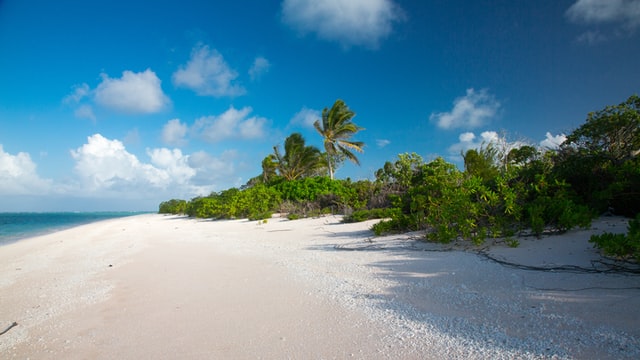Combatting Relationship Violence in the Marshall Islands

The island of Majuro in the Republic of the Marshall Islands is a beautiful place to live. Surrounded by the bright blue Pacific Ocean and the turquoise lagoon, it is 30 miles laced with coconut trees topped with climbing children, and white sand beaches filled with barbequing families.
It is also the capitol of the atoll country, overpopulated with different colored concrete homes lining the single road, littered with plastic lunch containers and broken beer bottles. It was here that I spent a year teaching 7th graders English at Majuro Middle School.
I knew that the Marshall Islands had high rates of teen pregnancy and relationship violence, and I wanted to help my students if and when they dealt with these problems.
My classroom was always crammed with about 30 Marshallese-speaking students during each class period. Their English abilities varied from speaking only a few words to speaking English fluently, and I spent much of my time reading children’s books and having them throw beanbags around the room in an effort to engage them and to get them to speak English.
While this was my job as a volunteer, and was important for my students’ education, I soon learned that my students needed other education as well. Because they were between 11 and 16 years old, my students were often talking about dating. In the traditional Marshallese way, I was only privy to the conversations between the girls and this started very slowly. The girls in my classes started telling me about the boys they thought were cute and then started talking to me about the boys they were dating, and then, slowly, started coming to me for advice.
Some of what they sought advice for were things like where they could go for a date and what exactly they should say to the boy they liked over lunch. But one day, the conversation turned to something more serious.
I sat on the front steps with a couple of the girls who were debating about whether or not one of them should break up with her boyfriend. When I inquired further, I learned that her boyfriend had hit her.
Combatting Relationship Violence in the Marshall Islands.
This was the reason I had spent hours with the girls offering my advice on their much less serious problems. I had hoped that they would begin to trust me and come to me with more serious problems. I knew that the possibility that these 7th graders dealt with more serious issues was great. I knew that the Marshall Islands had high rates of teen pregnancy and relationship violence, and I wanted to help my students if and when they dealt with these problems.
I talked through the situation with them and gave them confidence that violence in a relationship was serious, not something that anyone deserves, and that there wasn’t anything that she had done to bring it on. This student ended up breaking up with her boyfriend, and I continued to offer advice and speak to girls on the front steps after school.
One Monday, a few weeks later, I came into school with a small cut on my face from my nose to my lip. I had gone on a trip to an uninhabited island across the lagoon and had jumped off the diving board on the dock and accidently cut my own lip with my nail. I thought nothing of it, but my students thought differently.
Combatting Relationship Violence in the Marshall Islands.
I was asked multiple times if I had been hit by my male roommate, a fellow volunteer and teacher. After exasperatingly telling students over and over again how I had actually cut myself and insisting that Andrew hadn’t and would never hit me, a student walked over to me shaking his head. He put his hand on my shoulder and said in perfect English, “He hits you because he loves you.”
Now this statement was shocking for a couple of reasons, but not for the implied relationship that I was supposed to be in with my roommate. This was a common misunderstanding because in the Marshall Islands, an unrelated male and female who are living together would normally be married, hence the assumption of abuse. What the student said was shocking because of the sentiment behind it and also because he had used perfect English to convey it.
I marched down the hallway to get help from Andrew (the accused party), hoping that his collaboration would convince my students not only of his innocence but also help them understand that violence was not a part of a healthy relationship. While we succeeded in our mission to convince our students that Andrew hadn’t and wouldn’t hit me, I knew that the larger problem of what our students believed about relationship violence was still an issue that I wanted to address.
He put his hand on my shoulder and said in perfect English, “He hits you because he loves you.”
This was the event that sparked me to start a once-a-week after school club. Girls Club, as we called it, was a safe place for the girls to come to talk about relationships and sex. I talked to them about healthy relationships, relationship violence, reproductive health, and safe sex. We talked about body image and we spoke about their boyfriends and crushes.
I pushed for my students to make relationship choices for themselves and to think about their futures and school. But I also made sure they knew where to get condoms and how to use them. It quickly became my favorite part of my week and the most rewarding experience during my year of teaching in the Marshall Islands.
Photo for Combatting Relationship Violence in the Marshall Islands by Unsplash.








